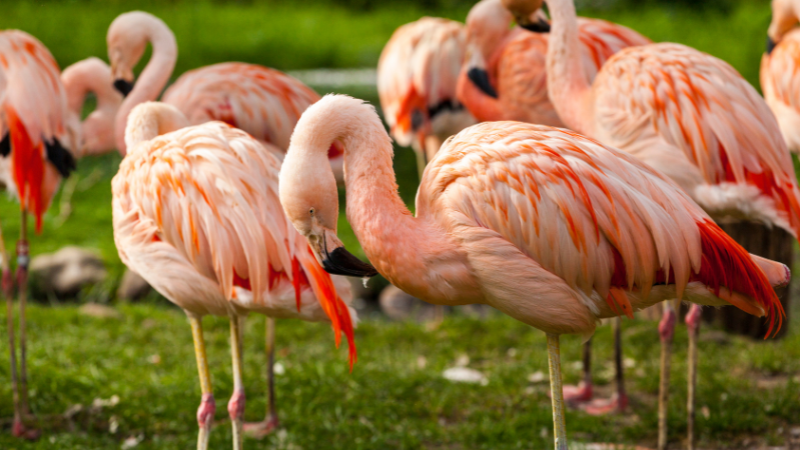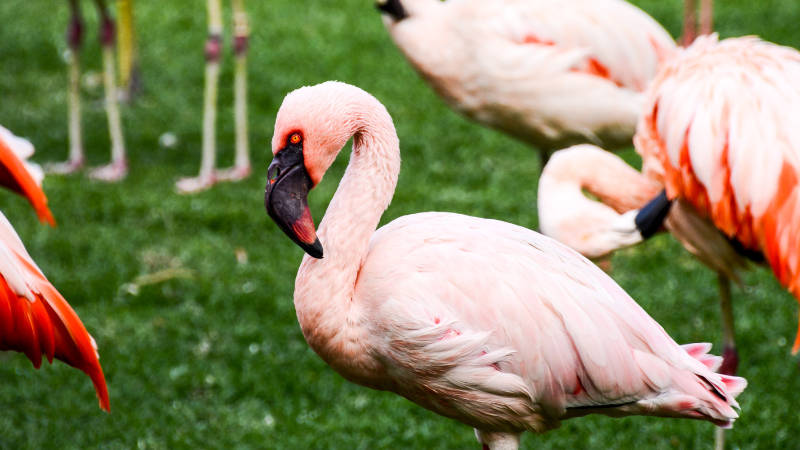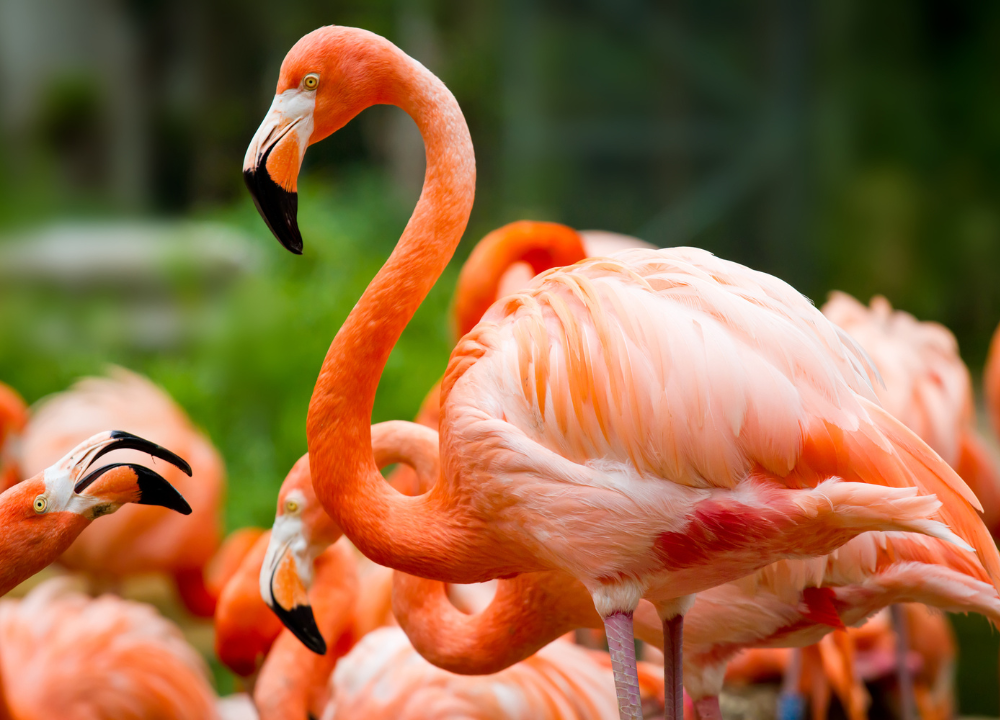No, it is not recommended to have flamingos as pets due to their specific habitat and care requirements. Flamingos are social birds that thrive in large groups and need access to large bodies of water to swim, feed, and fulfill their natural behaviors.
Considerations Before Getting A Flamingo As A Pet
Thinking of adding a flamingo to your family? Hold your horses! Before you rush off to buy one of these magnificent creatures, there are several important considerations you need to take into account. Flamingos are not your typical household pet, and they require a specific environment and care to thrive. In this section, we will explore the legal restrictions, space and habitats, financial considerations, and the commitment involved in owning a flamingo.
Legal Restrictions
Before imagining a beautiful pink flamingo strutting around your backyard, it’s crucial to check the legal restrictions in your area. Flamingos are considered exotic birds and may be protected by wildlife conservation laws. You may need to obtain a permit or license to own a flamingo legally. It is essential to research your local regulations and consult the relevant authorities to ensure compliance.
Space And Habitats
Flamingos are large birds that require ample space to move around and engage in natural behaviors. A spacious outdoor area with suitable habitats is essential for their well-being. A flamingo enclosure should include an artificial pond or shallow water source, as flamingos use their iconic long legs to filter feed. They also require plenty of open space to walk, stretch their wings, and socialize. Consider whether you have enough room in your backyard or if you can provide a suitable alternative, such as an aviary, to meet their space requirements.
Financial Considerations
While flamingos may seem like a luxurious pet choice, they also come with significant financial responsibilities. The initial cost of acquiring a flamingo can be substantial, as they are not typically found in conventional pet stores. Additionally, ongoing expenses such as veterinary care, high-quality flamingo feed, maintenance of their habitat, and potential permits or licenses can quickly add up. It is crucial to assess your budget and ensure you have the financial resources to meet these expenses throughout the flamingo’s lifespan, which can be up to 40 years in captivity.
Commitment
Lastly, owning a flamingo requires a considerable commitment of time, effort, and attention. Flamingos are social creatures that thrive in flocks, and they demand regular interaction and mental stimulation. Daily care routines include feeding, cleaning their habitat, monitoring their health, and providing enrichment activities to keep them physically and mentally stimulated. Consider whether you have the time and dedication to provide the necessary level of care for such a unique and demanding pet.
While the idea of owning a flamingo may sound glamorous, it’s essential to consider these factors carefully before diving into pet ownership. By understanding the legal restrictions, ensuring a suitable space and habitat, evaluating the financial implications, and being ready for a long-term commitment, you will be better equipped to decide if owning a flamingo is the right choice for you.

Feeding And Care For Pet Flamingos
Flamingos are undoubtedly stunning creatures that inspire awe with their vibrant plumage and graceful presence. Their unique charm has led many animal lovers to wonder if these majestic birds can be kept as pets. While the idea of having a pet flamingo might sound enticing, it is crucial to understand the responsibilities that come with caring for these birds. In this article, we will delve into the essential aspects of feeding and care for pet flamingos, including their feeding requirements, housing and enclosure needs, socialization and enrichment, as well as healthcare.
Feeding Requirements
Being able to meet the specific feeding requirements of pet flamingos is crucial for their health and well-being. Flamingos primarily feed on a diet consisting of crustaceans, small fish, insects, and algae. To mimic their natural feeding habits, it is important to provide them with a balanced diet that includes:
- Freshwater shrimp or prawns
- Small fish, such as minnows or guppies
- Insects like crickets or mealworms
- High-quality pelleted flamingo feed
- Leafy greens and vegetables
It is essential to consult with an avian veterinarian to develop a suitable feeding plan based on the age, size, and overall health of your pet flamingo. Additionally, ensuring access to clean and freshwater is essential for their hydration needs. Providing food in shallow dishes or trays can also stimulate their natural feeding behaviors.
Housing And Enclosure
Creating a suitable housing and enclosure for pet flamingos is vital to mimic their natural habitat and ensure their safety and well-being. Flamingos require spacious and secure areas to thrive, with access to both land and water. Here are some key considerations when designing their housing and enclosure:
- A large, well-ventilated and sunlit enclosure, preferably with a natural or artificial water source
- The enclosure should have a variety of vegetation, such as tall grasses and shrubs, to provide shade and privacy for the birds
- A shallow pond or pool deep enough for the flamingos to wade and bathe in
- The enclosure should be landscaped to prevent flooding and allow for easy cleaning and maintenance
- Netting or other protective measures should be in place to prevent escape and protect the flamingos from predators
Socialization And Enrichment
Flamingos are highly social animals and thrive in the company of their own kind. It is recommended to keep more than one flamingo as pets to provide them with the social interaction they require. Additionally, incorporating enrichment activities in their daily routine is essential to keep them mentally stimulated and prevent behavioral issues. Some ideas for enriching the lives of pet flamingos include:
- Providing mirrors or reflective surfaces to stimulate social behavior
- Offering puzzles or toys that encourage foraging and problem-solving
- Varying their environment by introducing new objects or rearranging their enclosure periodically
- Regular interaction and positive reinforcement training sessions to foster a bond with their human caregivers

Healthcare
Ensuring the health and well-being of pet flamingos requires a proactive approach to their healthcare needs. Regular veterinary check-ups with an avian specialist are crucial to monitor their overall health, identify any underlying issues, and receive appropriate vaccinations or treatments. Additionally, maintaining excellent hygiene in their enclosure by regularly cleaning the water source, removing excrement, and providing a clean environment is essential to prevent the spread of diseases. Observing their behavior and immediately consulting a veterinarian if there are any signs of illness or distress is of utmost importance.
By understanding and addressing the specific feeding, housing, socialization, and healthcare needs of pet flamingos, you can provide a safe and enriching environment for these remarkable birds. However, it is important to note that owing a pet flamingo is a significant responsibility that requires ample knowledge, resources, and commitment.
Flamingo Species Suitable For Domestication
Are you intrigued by the idea of having flamingos as pets? While it may sound exotic and exciting, not all flamingo species are suitable for domestication. It’s crucial to understand the specific requirements and considerations for each species before diving into flamingo ownership. In this blog post, we will explore the different species that are more adaptable to domestication, including the Lesser Flamingo, Chilean Flamingo, Caribbean Flamingo, and Greater Flamingo.
Lesser Flamingo
The Lesser Flamingo, scientifically known as Phoeniconaias minor, is one species that is relatively easier to have as a pet. These beautiful birds are found in various parts of Africa, including Kenya, Tanzania, and Ethiopia. They are famous for their striking pink plumage, slender build, and unique feeding habits.
If you are considering a Lesser Flamingo as a pet, you should be prepared to provide them with a spacious habitat that mimics their natural surroundings. These birds are highly social and live in large flocks, so they may become stressed and unhappy if kept alone. It’s advisable to have at least a pair of Lesser Flamingos to keep them content and engaged.
Chilean Flamingo
The Chilean Flamingo, scientifically known as Phoenicopterus chilensis, is another species that can thrive in a domestic setting with proper care and attention. These elegant birds are native to parts of South America, including Argentina, Chile, and Peru.
Chilean Flamingos are known for their vibrant plumage, with a mix of pale pink and white feathers. They are also slightly larger than the Lesser Flamingo. Similar to their counterparts, Chilean Flamingos are highly social and prefer living in flocks. Therefore, it is essential to provide them with an enriched environment that supports their natural behaviors and allows for social interactions.
Caribbean Flamingo
The Caribbean Flamingo, scientifically known as Phoenicopterus ruber, is a visually striking species that can captivate bird enthusiasts with its bright pink feathers and tall, slender physique. They are native to the Caribbean region, including the Bahamas, Cuba, and parts of Mexico.
If you are considering keeping Caribbean Flamingos as pets, note that they are highly social and thrive in large groups. They require ample space to roam and have access to suitable water areas for feeding and bathing. It’s important to provide a well-maintained habitat that offers opportunities for socializing, as these birds love to interact with others of their kind.
Greater Flamingo
The Greater Flamingo, scientifically known as Phoenicopterus roseus, is perhaps the most well-known and recognizable flamingo species. These majestic birds can be found in several parts of the world, including Africa, Europe, and Asia.
The Greater Flamingo stands out with its tall stature and striking pink and white feathers. They are known for their fascinating feeding techniques that involve filter-feeding on small organisms in the water. If you are contemplating having a Greater Flamingo as a pet, you must be prepared to provide them with a large and spacious habitat, as they require plenty of room to spread their wings and engage in their natural behaviors.
While the Lesser Flamingo, Chilean Flamingo, Caribbean Flamingo, and Greater Flamingo are among the species that are more adaptable to domestication, it’s important to remember that flamingos, in general, have specific needs and requirements that should be carefully considered before bringing them into your home. Adequate space, appropriate nutrition, and fulfilling social environments are essential for their well-being and happiness.

Risks And Challenges Of Keeping Flamingos As Pets
While the idea of owning a flamingo as a pet may seem intriguing and delightful, it is crucial to understand the risks and challenges associated with such an endeavor. Flamingos are exotic creatures with specialized needs that make them unsuitable for the average pet owner. It is essential to consider factors such as legal consequences, specialized care and maintenance, as well as the social and environmental impact of keeping flamingos as pets.
Legal Consequences
When it comes to keeping flamingos as pets, legal consequences must be carefully considered. Flamingos are protected under various wildlife conservation laws, both nationally and internationally. These laws are in place to safeguard the well-being and preservation of endangered species. Owning a flamingo without the necessary permits and licenses can result in severe penalties, including fines and even imprisonment.
Specialized Care And Maintenance
Flamingos require specialized care and maintenance that can be challenging for the average pet owner. These mesmerizing birds thrive in specific habitats, such as saltwater lagoons or tropical wetlands, which are difficult to replicate in a domestic setting. Providing flamingos with the right diet, which mainly consists of brine shrimp and algae, can also be demanding. Additionally, they require a spacious enclosure with access to water bodies deep enough for them to immerse their full body.
Moreover, flamingos are highly social creatures and benefit from living in large flocks. Replicating this social environment can be a considerable challenge, as these birds require constant interaction with their own species. Isolating a flamingo from its natural social setting could lead to significant stress and potential health issues.
Social And Environmental Impact
The social and environmental impact of keeping flamingos as pets should not be underestimated. Flamingos play a crucial role in the ecosystems they inhabit, contributing to the balance of aquatic life and the health of their habitats. Removing them from their natural environment disrupts these delicate ecosystems and can have far-reaching consequences for other species and the environment as a whole.
Moreover, the demand for captive flamingos as pets has led to illegal wildlife trafficking, further endangering their populations in the wild. Encouraging the preservation and conservation of flamingo species in their natural habitats is essential for maintaining biodiversity and ecosystem equilibrium.
In conclusion, while the idea of having a flamingo as a pet may be enchanting, the risks and challenges associated with it are significant. Legal consequences, specialized care and maintenance, as well as the social and environmental impact, all contribute to the unsuitability of flamingos as domestic pets. It is essential to prioritize the well-being and conservation of these captivating birds by appreciating them in their natural habitats rather than attempting to keep them in captivity.
Alternatives To Owning A Pet Flamingo
Looking for an alternative to owning a pet flamingo? While these elegant birds may be appealing, they require specific care and environments that are not suitable for most households. However, there are some alternatives that can still bring joy and contribute to the conservation of flamingos and other bird species. Let’s explore a few of these options.
Visiting Flamingo Sanctuaries
One way to experience the beauty of flamingos up close is by visiting flamingo sanctuaries. These protected areas provide a safe haven for these magnificent birds, allowing them to thrive in a natural environment. By visiting a flamingo sanctuary, you can observe these creatures in their natural habitat and gain a deeper understanding of their behaviors and needs.
Supporting Flamingo Conservation
If you’re passionate about flamingos and want to contribute to their well-being, there are various ways you can support flamingo conservation efforts. Consider making a donation to organizations that specialize in protecting these birds and their habitats. Your contribution can help fund research, conservation projects, and educational initiatives that aim to safeguard the future of flamingos.
Adopting Other Bird Species
If you still long for a feathered companion, adopting other bird species can be a fulfilling alternative. Many bird species make fantastic pets and can bring joy and companionship into your life. From parrots and lovebirds to cockatiels and canaries, there are plenty of options to choose from. However, it’s important to research each species’ specific requirements to ensure you can provide a suitable environment and care for their unique needs.
Remember, while owning a pet flamingo may not be feasible, there are still ways to enjoy and support these magnificent birds. Whether it’s visiting a sanctuary, contributing to conservation efforts, or adopting another bird species, you can make a positive impact and nurture your love for nature and its creatures.
Frequently Asked Questions On Can You Have Flamingos As Pets
Can Flamingos Be Tamed?
Flamingos can’t be tamed. They are wild birds that prefer to live in large flocks and in their natural habitats.
Is A Flamingo A Good Pet?
A flamingo is not a suitable pet due to its specialized needs, including a specific diet and a large, natural habitat.
Are Flamingos Friendly Animals?
Yes, flamingos are friendly animals. They are social creatures known for their peaceful nature.
Can Flamingos Live In The Us?
Yes, flamingos can live in the US. They are known to inhabit various regions, including Florida and parts of Texas, where they thrive in wetland habitats.
Conclusion
Flamingos, these elegant and eye-catching creatures, may catch your attention and make you wonder if they can be kept as pets. However, it’s important to note that flamingos are wild birds and require specific habitats and diets that are difficult to replicate in a domestic environment.
While some countries allow private ownership of flamingos, it is essential to consider their welfare and the expertise needed to care for them properly. Ultimately, it’s best to admire these majestic creatures in their natural habitats, where they can thrive and fulfill their roles in the ecosystem.







